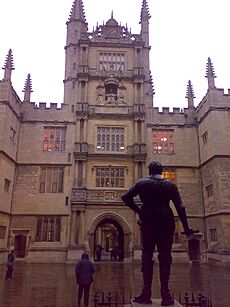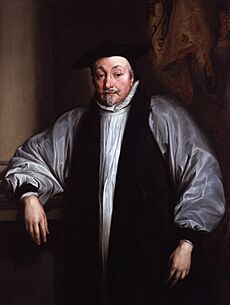Brian Twyne facts for kids
Quick facts for kids
Brian Twyne
|
|
|---|---|
| Born | c. 21 July 1581 Southwark, London, England
|
| Died | 4 July 1644 (aged 62) Oxford, England
|
| Alma mater | Corpus Christi College, Oxford |
Brian Twyne (born around 25 July 1581 – died 4 July 1644) was an English historian and scholar at the University of Oxford. He is known for his important work in organizing Oxford University's rules and records.
After studying at Corpus Christi College, Oxford, he became a Fellow (a senior member) of the college in 1606. In 1608, he published his main book, a history of Oxford University. This book aimed to show that Oxford was older than Cambridge University. A modern writer called it "a remarkable achievement for a young scholar of twenty-eight."
Brian Twyne also played a key role in updating the university's official rules. This happened under William Laud, who was the head of the university and also a very important church leader. For his hard work, Twyne was made the first Keeper of the Archives in 1634. In this job, he helped Oxford get a new royal charter. This charter confirmed the university's rights and special powers. He also helped the university in its disagreements with the local city government.
Contents
Brian Twyne's Early Life and Studies
Brian Twyne was born around July 25, 1581, in Southwark, which is now part of London. His father, Thomas Twyne, was a translator and doctor. His grandfather, John Twyne, was a schoolmaster and historian. Brian followed in his father's footsteps and studied at Corpus Christi College, Oxford. He probably went to grammar school in Lewes, Sussex, before that.
He officially joined Oxford University around February 6, 1596. He earned his first degree (Bachelor of Arts) on July 23, 1599. He later became a Fellow of Corpus Christi College in 1606. The next year, he became a priest. Even though he was also a vicar in Rye, Sussex, he mostly stayed in Oxford. Other priests handled his duties in Rye.
Writing the First Oxford History

Twyne published his main book, Antiquitatis academiae Oxoniensis apologia, in 1608. This was the first printed history of Oxford University. It was written to argue that Oxford was older than Cambridge University.
At the time, Oxford claimed it was founded by Trojans and Greek thinkers after the Trojan War. Cambridge, on the other hand, said it was founded by a Spanish king before Christianity. Cambridge also argued that Oxford was only founded by Alfred the Great in the 800s.
However, in 1603, historian William Camden published a new version of a book about King Alfred. This new version said that Alfred visited Oxford in 886 to solve student problems. This meant the university existed before Alfred's visit, making Oxford seem older.
Twyne then started gathering information to prove Oxford was the older university. He used old documents from the university, colleges, and the city of Oxford. He also used writings from ancient authors like Homer and Aristotle. His book was 456 pages long and was approved by a university committee. One committee member praised his writing and knowledge.
However, Twyne himself had doubts about some of the information. He couldn't find the part about Alfred's visit in any original old books. He asked Camden about it, who said it came from a copy given to him by Sir Henry Savile. Today, many believe Savile added that false claim, and Camden knew it. Even in Twyne's time, some historians found his ideas about Oxford's founding a bit amusing.
Twyne dedicated his book to Robert Sackville, 2nd Earl of Dorset. The university printer published the book.
Twyne's Work at Oxford
Twyne spent a lot of time studying old books and papers at the Bodleian Library. This famous library was started by Thomas Bodley in 1602. Twyne's father also gave books to the library.
When Bodley died in 1613, Twyne wrote poems in Latin and Greek to honor him. He even remembered King James I calling Bodley "Sir Thomas Godley." However, Twyne was not happy with Thomas James, the first librarian. He complained about missing papers, wrong records, and delays in getting new books. He also said the librarian wasn't often there and left papers everywhere. The librarian was told to improve his behavior.
In 1614, Thomas Anyan became the head of Corpus Christi College. He made Twyne the Greek lecturer. By 1623, Twyne left his position as a Fellow. This was possibly to avoid taking sides in a disagreement between the college head and the other Fellows.
Twyne hoped to become the Camden Professor of Ancient History. He said that Camden promised him this job in 1623. However, Camden later wrote that he had been tricked and did not intend to appoint Twyne. Twyne died before the actual professor, so he never got the job.
Updating University Rules and Archives

At this time, Oxford University's rules were messy and hard to find. They were written in different old books, and some rules that were no longer used were still mixed in with current ones.
Twyne was first asked to join a committee to fix these rules in 1614, but nothing came of it. He then worked to improve Corpus Christi College's own records in 1627 and 1628. He copied many important old documents into 30 new books.
In 1630, Twyne joined a new group chosen by the university's new head, William Laud. This group's job was to rewrite all the university's rules. Twyne did most of the work in writing these new rules. By 1633, the work was finished.
As a reward, Twyne was appointed the university's first Keeper of the Archives on August 11, 1634. This new job was created because many of Oxford's old records had been lost due to poor care. The university needed an expert to look after them and help defend its interests. Twyne was paid at least £40 a year for this important role.
After becoming Keeper, Twyne worked to get a royal confirmation of Oxford's rights. He also wanted to make sure the city of Oxford stayed under the university's control. A new royal charter was obtained in 1636 to confirm the updated rules.
Under Twyne, the university's records were moved into a special room in the Tower of the Five Orders at the Bodleian Library. Three of the wooden cabinets built then to store the records are still used today!
Twyne also advised the university in its arguments with the city leaders. These arguments were about things like courts, business licenses, and markets. Twyne strongly disliked the townspeople. He believed they were "too near" the university to be separate. Because of this, his actions sometimes led to small disagreements turning into big, unnecessary legal fights.
Brian Twyne's Personal Life
We know about Twyne's private life because he often wrote notes on the blank sides of letters he received. This saved some letters between him and his father from 1596 to 1613.
As a student, Twyne wrote to his father, promising he was working hard. He also asked for "money, clothes, books and cheese." He complained that his allowance wasn't enough to hire someone to do tasks like making a fire, but his father wasn't very understanding. We also know he enjoyed playing the lute.
Later, his father brought up the idea of marriage. Twyne was eager to give reasons why it wasn't the right time, like not having enough money. When his father died in 1613, Twyne inherited his father's property. This meant he no longer had pressure to marry, and he remained single for the rest of his life.
Death and What He Left Behind
Brian Twyne died on July 4, 1644. He made his will earlier that day, leaving his books and old papers to his college and the university. He also left some money to friends and those who helped him when he was sick.
His collection of old papers included 24 main books, with about 12,000 pages of notes and copies. He was buried in the chapel of Corpus Christi College.
Twyne was a very hard-working researcher and collector of old documents. Important scholars like John Selden and William Camden often asked him for advice. Strickland Gibson, a later Keeper of the Archives, called him "one of the greatest of Oxford antiquaries." Gibson said Twyne's collections were "one of his greatest achievements, and in themselves a monument."
Another historian, Antony Wood, used Twyne's collections a lot for his own history of the university, but he didn't always give Twyne proper credit. The city leaders, however, strongly disliked Twyne because of his actions against them. Interestingly, many of the city's old records from the Middle Ages were lost in the 1600s. We only know about them today because Twyne had copied them into his own collection.
In 1934, when Twyne was honored, James Patrick Ronaldson Lyell gave a copy of Twyne's book, Antiquitatis academiae Oxoniensis apologia, to the Keeper of the Archives.
Images for kids
 | Selma Burke |
 | Pauline Powell Burns |
 | Frederick J. Brown |
 | Robert Blackburn |



